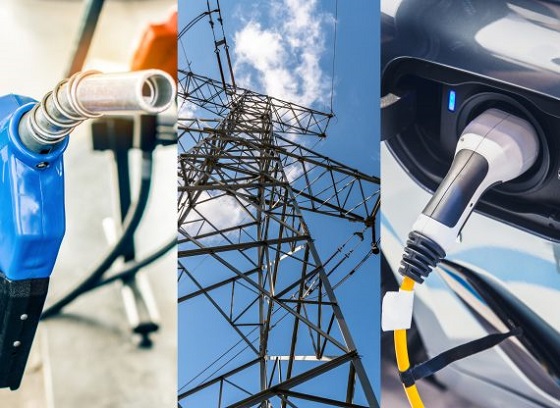Automotive
Two thirds of Canadians say banning conventional vehicles by 2035 is “unrealistic”

From the Montreal Economic Institute
Seven in 10 Canadians are concerned about the negative impact of cancelled energy projects on Canadian jobs.
More than half of Canadiens are against the federal mandate forcing all new cars sold in Canada to be electric by 2035, shows a new MEI-Ipsos survey released this morning.
“Across the country, Canadians are a lot more hesitant to ban conventional vehicles than their elected representatives in Ottawa are,” said Krystle Wittevrongel, director of research at the MEI. “They have legitimate concerns, most notably with the cost of those cars, and federal and provincial politicians should take note.”
The poll shows that 55 per cent of Canadians disagree with Ottawa’s decision to ban the sale of conventional vehicles by 2035. In every region surveyed, a larger number of respondents were against the ban than in favour of it.
Among Canadians who don’t already own an electric vehicle, slightly fewer than one in four said their next car would be electric.
Key reasons cited for this lukewarm attitude included the high cost of the cars (70 per cent), the lack of charging infrastructure (66 per cent), and their reduced performance in Canada’s cold climate (64 per cent).
Across the country, only 26 per cent of Canadians believe Ottawa’s plan to ban the sale of conventional vehicles is realistic. Meanwhile, 66 per cent maintain that the plan is unrealistic.
“Canadians understand that 2035 is sooner than Ottawa thinks, and nothing indicates electric vehicle adoption rates are going to follow what federal lawmakers anticipated,” notes Ms. Wittevrongel. “Concerns with their high cost, the lack of charging infrastructure and their poor performance in our cold climate remain strong.”
The survey also found Canadians were troubled by the effects that federal legislation has had in stalling or cancelling energy projects.
Seven in 10 respondents were concerned by the negative impact on Canadian jobs arising from the cancellation of tens of billions of dollars in energy projects due to regulatory hurdles.
Slightly more than three in four Canadians (76 per cent) say the federal government’s environmental impact assessment project takes too long, with only nine per cent taking the opposite view.
“Canadians understand that our energy industry plays a key role in Canada’s economy, and that lengthy approval delays from regulators have a negative impact on a project’s chances of happening,” explains Ms. Wittevrongel. “They are looking for leadership in Ottawa and in the provinces to cut down on bureaucratic hurdles and shorten the time it takes to get shovels in the ground.”
A sample of 1,190 Canadians 18 years of age and older was polled between September 18th and 22nd, 2024. The results are accurate to within ± 3.3 percentage points, 19 times out of 20.
The results of the MEI-Ipsos poll are available here: https://www.iedm.org/wp-
The MEI is an independent public policy think tank with offices in Montreal and Calgary. Through its publications, media appearances, and advisory services to policymakers, the MEI stimulates public policy debate and reforms based on sound economics and entrepreneurship.
Automotive
Tesla Vandals Keep Running Into The Same Problem … Cameras


From the Daily Caller News Foundation
By Hudson Crozier
People damaging Teslas in anger toward their owners and Elon Musk aren’t picking up on the fact that the vehicles have multiple cameras capable of catching them in the act.
At least nine perpetrators have been caught on video keying, writing graffiti or otherwise defacing Tesla vehicles in parking lots across the U.S. in the month of March alone. Most have led to an arrest or warrant based partly on the footage, which Tesla’s “Sentry Mode” automatically films from the side of the unattended vehicle when it detects human activity nearby.
“Smile, you’re on camera,” Tesla warned in a March 20 X post about its Sentry Mode feature. Musk’s company has been working to upgrade Sentry Mode so that the vehicles will soon blast music at full volume when vandals attack it. The camera system, however, has not stopped an increasing number of vandals from singling out Tesla owners, usually in protest of Musk’s work in the Trump administration for the Department of Government Efficiency (DOGE).
One incident happened on March 29, the same day leftists coordinated protests around the country for a “Global Day of Action” against Musk. That Saturday also saw alleged instances of violence at protests. The demonstrations stemmed from an online call to action by groups such as the Disruption Project, which encourages activists to foment “uprisings,” find a “target’s” home address and other confrontational tactics.
Tesla’s press team did not respond to a request for comment.
One man allegedly caught on camera keying a Tesla SUV on March 24 apologized to the owner who confronted him in a parking lot in Pennsylvania, police and media reports said. The man faces charges of criminal mischief, harassment and disorderly conduct for allegedly carving a swastika onto the vehicle.
“I have nothing against your car, and I have nothing against you,” the suspect said while the owner filmed him in the parking lot. “Obviously, I have something against Elon Musk.” The man called his own behavior “misguided.”
The defendant’s lawyer told Fox News his “client is a proud father, long-time resident, and is currently undergoing cancer treatment” and that he would not comment publicly “pending the outcome of the case.”
One of the most aggressive acts caught by Sentry Mode was in the case of a man who drove an ATV-style vehicle into a Tesla on March 25. Texas police identified the man as Demarqeyun Marquize Cox, arrested him and said he allegedly gave two other nearby Teslas the same treatment while also writing “Elon” on them. The public defender office representing Cox did not respond to a voicemail from the Daily Caller News Foundation.
Tesla cameras also caught three other people in Florida, Texas and Arizona keying and smearing bubble gum on the vehicles in March. The three suspects named by police do not have attorneys listed in county records available for contact.
Many of the vandalism cases since Trump’s return have reportedly caused thousands of dollars in damage for individual owners. For example, the bubble gum incident in Florida brought $2,623.66 in costs, while another keying incident in Minnesota brought $3,200.
Some reported attacks on Tesla vehicles and chargers have gotten the attention of federal law enforcement, including cases of alleged firebombing or shooting.
Two other suspected vandals in New York, one in Minnesota and one in Mississippi have reportedly avoided arrest for now — with one owner declining to press charges — but were all seen on the Teslas’ cameras scratching up the vehicles. Police identified the Mississippi suspect as an illegal migrant from Cuba.
One Tesla owner in North Dakota ridiculed a man who allegedly carved the letter “F” into his Cybertruck in a Costco parking lot — as seen on the Cybertruck’s camera. The defendant faces charges of criminal mischief, and county records say he is representing himself in court.
“I can’t believe this guy is potentially ruining his life to follow a political ideology,” the owner told WDAY News.
“If you’re going to vandalize these vehicles, you’re going to get caught,” the owner said.
Automotive
Dark Web Tesla Doxxers Used Widely-Popular Parking App Data To Find Targets, Analysis Shows


From the Daily Caller News Foundation
By Thomas English
A dark web doxxing website targeting Tesla owners and allies of Elon Musk appears to be compiled from hacked data originally stolen from a massive ParkMobile app breach in 2021, according to records obtained by a data privacy group.
The site, known as DogeQuest, first appeared in March and publishes names, home addresses, contact details and other personal information tied to Tesla drivers and DOGE staff. Marketed as a hub for anti-Musk “creative expressions of protest,” the platform has been linked to real-world vandalism and remains live on the dark web. Federal investigations into DogeQuest are already underway, the New York Post first reported.
“If you’re on the hunt for a Tesla to unleash your artistic flair with a spray can, just step outside — no map needed! At DOGEQUEST, we believe in empowering creative expressions of protest that you can execute from the comfort of your own home,” the surface-web DogeQuest site reads. “DOGEQUEST neither endorses nor condemns any actions.”

A screenshot of the DogeQuest surface website captured on April 3, 2025. (Captured by Thomas English/Daily Caller News Foundation)
ObscureIQ, a data privacy group, compiled a breakdown of the data — obtained by the Daily Caller News Foundation — and determined 98.2% of records used to populate the site matched individuals affected by the 2021 ParkMobile breach.
Encouraging destruction of Teslas throughout the country is extreme domestic terrorism!! https://t.co/8TCNIbrQxA
— Elon Musk (@elonmusk) March 18, 2025
DogeQuest originally appeared as a surface web doxxing hub, encouraging vandalism of Teslas and displaying names, addresses, contact details and, in some cases, employment information for roughly 1,700 individuals. The site used stolen ParkMobile records along with data purchased from brokers, flagging anyone who had a Tesla listed in their vehicle registration profile, according to ObscureIQ’s analysis.
The platform — now operating as “DogeQuest Unleashed” via a .onion dark web address — has also published personal details of high-value targets including senior military officials, federal employees and private sector executives in Silicon Valley. A spreadsheet reviewed by the Daily Caller News Foundation indicates several individuals targeted work areas like cybersecurity, defense contracting, public health and diplomatic policy. DOGE staff and their families appear prominently throughout the data.

A screenshot of DogeQuest’s surface website, captured on April 3, 2025. (Captured by Thomas English/Daily Caller News Foundation)
No other reporting has yet tied DogeQuest directly to the ParkMobile breach, which impacted over 21 million users in 2021. The company, which facilitates cashless parking across the U.S., quietly disclosed the breach in April of that year, admitting that “basic user information” had been accessed. ObscureIQ’s research shows that exposed data included email addresses, license plate numbers and phone numbers — enough to triangulate identity when paired with commercial data brokers.
The company agreed to a $32 million settlement to resolve a class-action lawsuit stemming from the data breach. The lawsuit alleged that ParkMobile failed to secure its Amazon Web Services cloud storage, allowing access to the data. Although payment data were reportedly not compromised, plaintiffs argued the exposed information still posed serious privacy risks — a claim now reinforced by its use in the DogeQuest doxxing campaign.
Despite federal attention, the site has proven difficult to keep offline, as the dark web mirror incorporates anonymized hosting methods, frustrating law enforcement takedown efforts.
The Department of Justice charged three suspects last week linked to physical attacks on Tesla vehicles, charging stations and dealerships across multiple states, though it has not publicly confirmed any link between those suspects and DogeQuest. Meanwhile, the FBI has acknowledged it is “actively working” on both the doxxing campaign and a parallel rise in swatting incidents affecting DOGE affiliates.
-

 Alberta2 days ago
Alberta2 days agoMedical regulator stops short of revoking license of Alberta doctor skeptic of COVID vaccine
-

 International2 days ago
International2 days agoUN committee urges Canada to repeal euthanasia for non-terminally ill patients
-

 MacDonald Laurier Institute2 days ago
MacDonald Laurier Institute2 days agoRushing to death in Canada’s MAiD regime
-

 Bruce Dowbiggin2 days ago
Bruce Dowbiggin2 days agoBettman Gives Rogers Keys To The Empire. Nothing Will Change
-

 2025 Federal Election2 days ago
2025 Federal Election2 days agoPoilievre Will Bring in ‘One and Done’ Resource Approvals, and Ten Specific Projects Including LNG Canada Phase II
-

 conflict1 day ago
conflict1 day agoZelensky Alleges Chinese Nationals Fighting for Russia, Calls for Global Response
-

 2025 Federal Election1 day ago
2025 Federal Election1 day agoHarper Endorses Poilievre at Historic Edmonton Rally: “This Crisis Was Made in Canada”
-

 Energy2 days ago
Energy2 days agoEnergy group urges Trump administration to restock oil reserves









